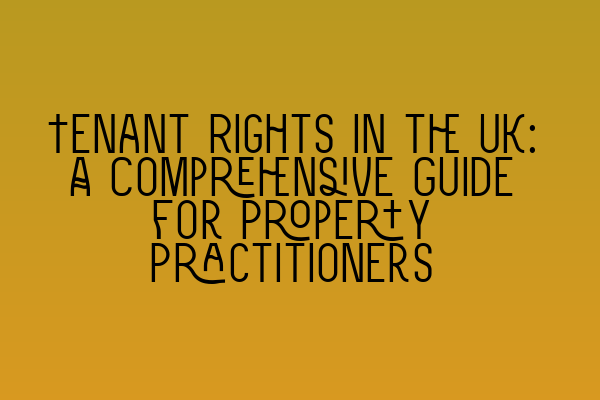Tenant Rights in the UK: A Comprehensive Guide for Property Practitioners
Introduction
Understanding tenant rights is crucial for property practitioners in the UK. As a solicitor specializing in property law, it is essential to be well-versed in the rights and responsibilities of both landlords and tenants. This comprehensive guide will provide you with an in-depth understanding of tenant rights in the UK, enabling you to assist your clients effectively while remaining within the confines of the law.
1. The Right to a Written Tenancy Agreement
One of the fundamental rights of a tenant is the right to a written tenancy agreement. This agreement outlines the terms and conditions of the tenancy, including rent, tenancy duration, and maintenance responsibilities. A written tenancy agreement helps protect both the tenant and the landlord, providing a legal framework for the tenancy.
For more information on tenancy agreements, consult our related article: SQE 1 Practice Mocks FLK1 FLK2.
2. Protection against Unfair Eviction
Tenants in the UK are entitled to protection against unfair eviction. Landlords must follow specific legal procedures and provide valid reasons for evicting a tenant, such as non-payment of rent or breach of tenancy terms. Unlawful eviction is a serious offense, and tenants have the right to take legal action if they are unfairly evicted from their rental property.
To prepare for potential eviction cases, take a look at our recommended practice exam questions: SQE 1 Practice Exam Questions.
3. Security of Tenure
Security of tenure is another important tenant right. In certain circumstances, tenants have the right to remain in the property even after their fixed-term tenancy has expired. This protection ensures that tenants have a stable living arrangement and are not forced to vacate the premises without reasonable notice.
For more information on security of tenure, refer to our comprehensive guide on SQE 2 preparation courses: SQE 2 Preparation Courses.
4. Right to Live in a Property that is Fit for Habitation
The right to live in a property that is fit for habitation is a crucial tenant right. Landlords have a legal duty to ensure that the property meets certain standards of quality and safety. If a property falls below these standards, tenants have the right to request repairs and improvements from their landlords.
To learn more about maintaining a habitable property, explore our in-depth guide on SQE 1 preparation courses: SQE 1 Preparation Courses.
5. Protection against Unfair Rent Increases
Tenants in the UK are protected against unfair rent increases. Landlords must follow specific procedures when increasing the rent, ensuring that the increase is reasonable and in line with current market rates. Tenants have the right to challenge excessive rent increases and seek legal recourse if necessary.
To stay informed about the latest SRA SQE exam dates and regulations, visit our article on SRA SQE exam dates: SRA SQE Exam Dates.
Conclusion
As a property practitioner, understanding tenant rights is essential for providing effective legal assistance to your clients. This comprehensive guide has provided an overview of the key tenant rights in the UK, including the right to a written tenancy agreement, protection against unfair eviction, security of tenure, the right to live in a fit for habitation property, and protection against unfair rent increases.
By familiarizing yourself with these rights and staying updated on relevant laws and regulations, you can confidently navigate the field of property law and successfully advocate for your clients. Remember, the rights and responsibilities of landlords and tenants must be balanced for a fair and effective rental market.
For further preparation material for property law and other SQE exams, explore our practice mocks and quizzes: SQE 1 Practice Mocks FLK1 FLK2.
Disclaimer: This blog post is intended for informational purposes only and should not be considered legal advice. Always consult with a qualified solicitor for specific legal concerns or questions related to tenant rights in the UK.
